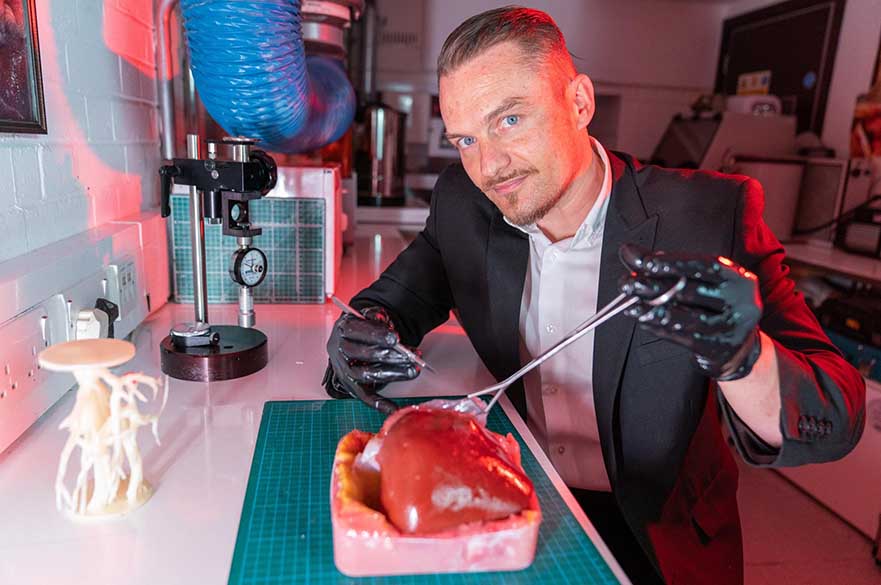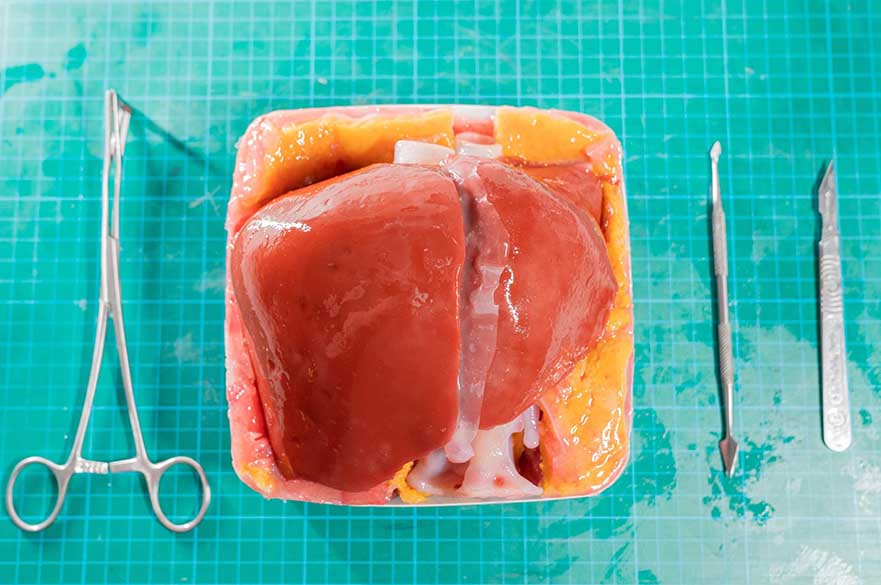3D-printed liver to help surgeons prepare for life-saving operations
Surgeons will perform liver resections with greater accuracy and deliver improved patient outcomes thanks to new research by Nottingham Trent University.
By Chris Birkle | Published on 15 June 2021
Categories: Press office; School of Art & Design;

Surgeons will perform liver resections with greater accuracy and deliver improved patient outcomes thanks to new research by Nottingham Trent University.
Senior Research Fellow Richard Arm has developed a way to 3D-print scan data of cancer-hit patient organs so that clinicians can rehearse difficult operations on lifelike models.
The aim is for them to become familiar with the hidden complexities of an operation – which are unique from patient to patient – prior to the real surgery.
A prototype 3D-printed model liver – based on an anonymised cancer patient – features the tactile qualities of a real diseased organ, including imitation blood and different tissue hardnesses, such as the blood vessels, liver tissue and the tumour itself.
The model – made from synthetic gels and fibres - even allows surgeons to use real surgical tools to practice endoscopies and laser ablation techniques, during which arteries are resealed by laser to prevent a patient bleeding out during surgery.
Interview with Richard Arm and Research Fellow
“Surgeons have an incredibly complicated job to remove some tumours to save people’s lives,” said Mr Arm, a PhD candidate in the School of Art & Design, and member of the Advanced Textiles Research Group (ATRG).
“But due to the limitations of existing technologies available to them, many surgeons only discover the true complexities of an operation when they are in the midst of the live procedure itself.
“Every patient is unique and has organs of different shapes, sizes and constructs, so there can be many hidden complications that they have to deal with.
“But this research shows how existing scan data and modern 3D-print processing methods can dramatically improve the preparation available before the first incision is even made.
“It could give surgeons increased confidence and may provide patients with improved outcomes, such as the increased retention of healthy tissue, reduced risk of infections and swifter recovery times.”

The 3D-printed model liver
The research also considers the potential for teaching trainee cancer surgeons in traditional and robotic tumour removal, and could improve robotic surgical interfaces and operator proficiency. It may also allow surgeons to become more familiar with using robots to perform surgery remotely.
The project was funded by Nottingham Trent University’s Medical Technologies and Advanced Materials fund and School of Art & Design.
Expertise in material testing and tissue characterisation was provided by Dr Arash Moghaddassian Shahidi, also of Nottingham Trent University’s ATRG.
Scan data and medical expertise was provided by Dr Christopher Clarke, Consultant Radiologist, at Nottingham University Hospitals NHS Trust.
Dr Clarke said: “This technology could give surgeons increased confidence in each procedure they undertake, by allowing them to better understand an individual patient’s anatomy and potentially reduce the risks to patients during what can be incredibly difficult, life-saving surgery.”
Notes for Editors
Press enquiries please contact Chris Birkle, Public Relations Manager, on telephone +44 (0)115 848 2310, or via email.
Nottingham Trent University (NTU) was named University of the Year 2019 in the Guardian University Awards. The award was based on performance and improvement in the Guardian University Guide, retention of students from low-participation areas and attainment of BME students.
NTU was also the Times Higher Education University of the Year 2017, and The Times and Sunday Times Modern University of the Year 2018. These awards recognise NTU for its high levels of student satisfaction, its quality of teaching, its engagement with employers, and its overall student experience.
The university has been rated Gold in the Government’s Teaching Excellence Framework – the highest ranking available.
It is one of the largest UK universities. With nearly 32,000 students and more than 4,000 staff located across four campuses, the University contributes £900m to the UK economy every year. With an international student population of more than 3,000 from around 100 countries, the University prides itself on its global outlook.
The university is passionate about creating opportunities and its extensive outreach programme is designed to enable NTU to be a vehicle for social mobility. NTU is among the UK’s top five recruiters of students from disadvantaged backgrounds and was awarded University of the Year in the UK Social Mobility Awards 2019.
A total of 82% of its graduates go on to graduate entry employment or graduate entry education or training within six months of leaving. Student satisfaction is high: NTU achieved an 87% satisfaction score in the 2020 National Student Survey, above the sector average of 83%.